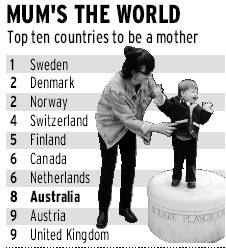
 |
Australia is one of the top places in the world to be a mother, according to an international survey, but that ranking is unlikely to boost the nation's declining fertility rate.
Australia was placed eighth, behind countries such as Sweden, Denmark and Canada, on the Mothers' Index, in a survey of 117 countries released yesterday by the relief organisation Save the Children.
However, Peter McDonald, a professor of demographics at the Australian National University, said the index failed to take into account work-family provisions, "now the principal factor around the world of why women give birth or not".
He said Australia's fertility rate was at a historic low of 1.37 births per woman of child-bearing age. It was unlikely to increase, even if the country was deemed one of the world's best places for mothers.
According to the index, the top spots for mothers were generally those
countries with the highest standards of health and education, and included
maternal and infant mortality rates, use of contraception, female literacy and
primary school enrolments.
Scandinavian countries took the top three spots, with first place to Sweden - which was found to have the lowest infant mortality rate in the world and the highest percentage of women with seats in the national government.
Niger, where the risk of women dying in childbirth was 600 times greater than in Sweden, was ranked the worst country in the world for mothers and children. African nations filled nine of the bottom 10 rankings.
Australia rated higher than both Britain and the United States, which was number 11. However, Australia slipped two spots from last year's index, overtaken by Finland and the Netherlands.
The infant mortality rate in Australia is 5.31 deaths per 1000 live births, compared to 3 in Sweden. About a quarter of lower house seats in the Federal Parliament are held by women, compared to 45 per cent in Sweden.
Australia has been in the top 10 in each of the previous three surveys, including third in 2000.
Dr McDonald said: "Australia's low birth rate is related to the extent to which the society enables women to combine motherhood with other aspects of their life that they value, particularly employment.
"In the modern society if the index is not measuring capacity to combine work and family then it is not a good measure of how good motherhood is in a country because that's now the principal factor around the world of why women give birth or not."
Save the Children also analysed conditions in 40 countries under armed conflict, finding that the Democratic Republic of Congo and Sierra Leone were the countries where women and children faced the most severe risks of brutality and violence.